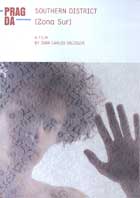
The Southern District (Zona sur) 2011
Distributed by Pragda, 302 Bedford Ave., #136, Brooklyn, NY 11249
Produced by Gabriela Maire
Directed by Juan Carlos Valdivia
DVD, color, 109 min.
General Adult
Family Relations, Latin America
Date Entered: 09/16/2016
Reviewed by Sandra Collins, Byzantine Catholic Seminary Library, Pittsburgh, PAThe Southern District (Zona sur) of the title refers to La Paz, Bolivia, an extravagantly wealthy albeit emotionally as well as geographically walled-off neighborhood that serves as the canvas against which family dynamics play out. A high-strung divorced mother (Ninón del Castillo) lives in her magnificent black-and-white hacienda with her three children and two servants who in reality serve as surrogate parents. Her college aged children—son Patricio (Juan Pablo Koria) and daughter Bernarda (Mariana Vargas)—are spoiled twenty-somethings of privilege who actively resent their mother’s shrewish concerns for appearance, yet have no qualms about taking her dwindling money. The sweet, uncomplicated 6-year-old Andres (Nicolás Fernández) provides the redeeming voice in this family of narcissistic, self-absorbed individuals. The servants—the family’s live-in butler Wilson (Pascual Loayaza) and gardener Mariana (Vivian Condori)—patiently suffer the older children’s indifference as well as the younger child’s relentless questions about what, as children, they wanted to be when they grew up.
This slice-of-life drama presents a family that is vacuous and mostly unlikeable in their self-centeredness. The older children ride roughshod over their mother who is more concerned that they keep with a certain class of people. When money runs short, she asks her devoted butler Wilson to simply go through her son’s pants pockets, failing to recognize that her lifestyle really is no longer sustainable. In an ironic turn of events, it will be an unlikely village rustic who will offer this family a gracious and hopefully, affirming way out of their financial as well as emotional corner.
Slow-paced and character driven, color plays a dramatic role in the background of this film. The façade of black and white with which the house is sumptuously decorated hides the fact that Carola can no longer afford her Beverly Hills-esque lifestyle. The family wears dazzling white almost exclusively until the reality of their changing situation hits them full-force and suddenly, everyone is wearing black. Human touch also figures in: early on, it’s merely manipulative, but in the final moments, has the ability to offer true meaning and compassion.
In Spanish with English subtitles, Southern District offers a dramatic picture of family dynamics in modern day South America. Due to language and nudity as well as explicitly adult themes, this film is recommended for adult audiences only.
Awards
- Best Actor Award (Pascual Loayza), Lima Latin American Film Festival 2010
- World Cinema Dramatic Directing Award, Sundance Film Festival 2010
- World Cinema Dramatic Screenwriting Award, Sundance Film Festival 2010